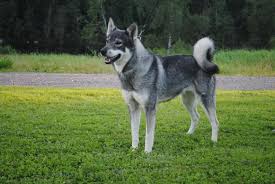
Jämthund
Conditions of detention
Jämthunds thrive in environments where they have plenty of space to exercise and explore. They are best suited to rural homes with large yards or access to open fields and forests. Due to their high energy levels and working instincts, they require regular physical activity.
Useful Fact: While Jämthunds can adapt to indoor living, they need ample outdoor exercise to remain healthy and happy. They excel in rural settings where they can engage in activities like hiking, hunting, and tracking.
Nutrition and diet
A balanced diet with high-quality dog food is essential for Jämthunds. Their diet should include a mix of proteins, fats, and carbohydrates to support their active lifestyle.
Useful Fact: Due to their active nature, Jämthunds may require a higher calorie intake compared to less active breeds. It is important to adjust their food based on their activity level and age.
Health
Jämthunds are generally healthy dogs, but they can be prone to specific health issues such as hip dysplasia and certain genetic conditions. Regular veterinary check-ups are important to monitor their health.
Useful Fact: Maintaining a healthy weight through proper diet and exercise can help reduce the risk of joint problems and other health issues common in larger breeds.
Grooming and care
The Jämthund has a dense, double coat that requires regular grooming to prevent mats and tangles. Weekly brushing helps keep their coat healthy, and more frequent grooming may be needed during shedding seasons. Bathing should be done as needed to keep their skin clean and healthy.
Useful Fact: Their thick coat is designed to protect them from harsh weather conditions, making them well-suited for colder climates. Regular grooming helps manage shedding and keeps their coat in good condition.
Education and training
Jämthunds are intelligent and eager to please, making them relatively easy to train. Positive reinforcement techniques work best. Early socialization and consistent training are crucial to ensure they grow into well-mannered adults.
Useful Fact: These dogs excel in obedience training and various dog sports, such as agility and tracking, due to their intelligence and high energy levels. Training sessions that incorporate play can keep them engaged and motivated.
Toys and entertainment
Interactive toys and activities that stimulate their mind and body are ideal for Jämthunds. They enjoy games that challenge their hunting instincts, such as fetch, scent-tracking, and puzzle toys.
Useful Fact: Providing a variety of toys and engaging in regular play sessions helps keep them mentally stimulated and prevents boredom.
Safety
Ensuring a secure environment is important for Jämthunds, especially when they are outdoors. Their strong prey drive can lead them to chase after small animals if not properly contained.
Useful Fact: A well-fenced yard is essential to keep them safe and prevent them from escaping or getting into trouble.
Accessories
Jämthunds benefit from durable collars, leashes, and harnesses designed for large, active dogs. Proper identification tags and microchips are also important.
Useful Fact: Providing comfortable bedding and chew toys can help keep them relaxed and occupied indoors.
Socialization
Early and consistent socialization helps Jämthunds become well-adjusted dogs. Exposing them to various people, animals, and environments from a young age is beneficial.
Useful Fact: Puppy classes and regular social outings can enhance their social skills and adaptability, making them more comfortable in different settings.
Travel and Transportation
Jämthunds travel well if accustomed to it from a young age. They should be secured in a crate or with a seatbelt harness during travel.
Useful Fact: Their adaptable nature makes them good travel companions, but frequent breaks during long journeys help them stay comfortable and reduce anxiety.
Behavior and psychology
Jämthunds are known for their friendly, energetic, and intelligent nature. They form strong bonds with their families and are generally good with children and other pets. They are also alert and make excellent watchdogs.
Useful Fact: Providing regular mental and physical stimulation helps maintain their positive behavior and overall well-being. Their playful and social nature makes them excellent companions.
Legal aspects
There are no specific legal aspects concerning Jämthunds, but local regulations regarding pet ownership should be followed. Ensuring they are registered and microchipped is important.
Useful Fact: Being aware of local leash laws and breed-specific legislation is important for responsible ownership. Registration and identification help in case they get lost.


